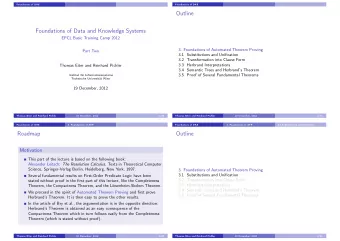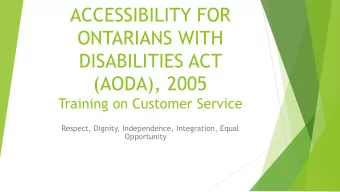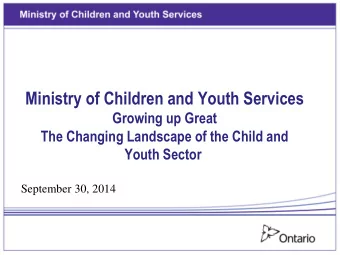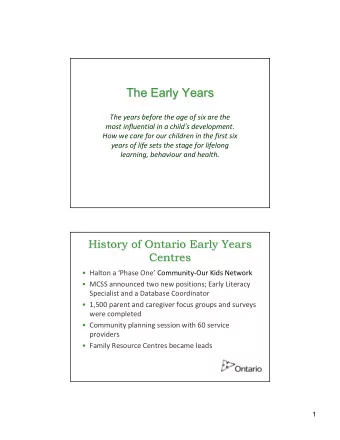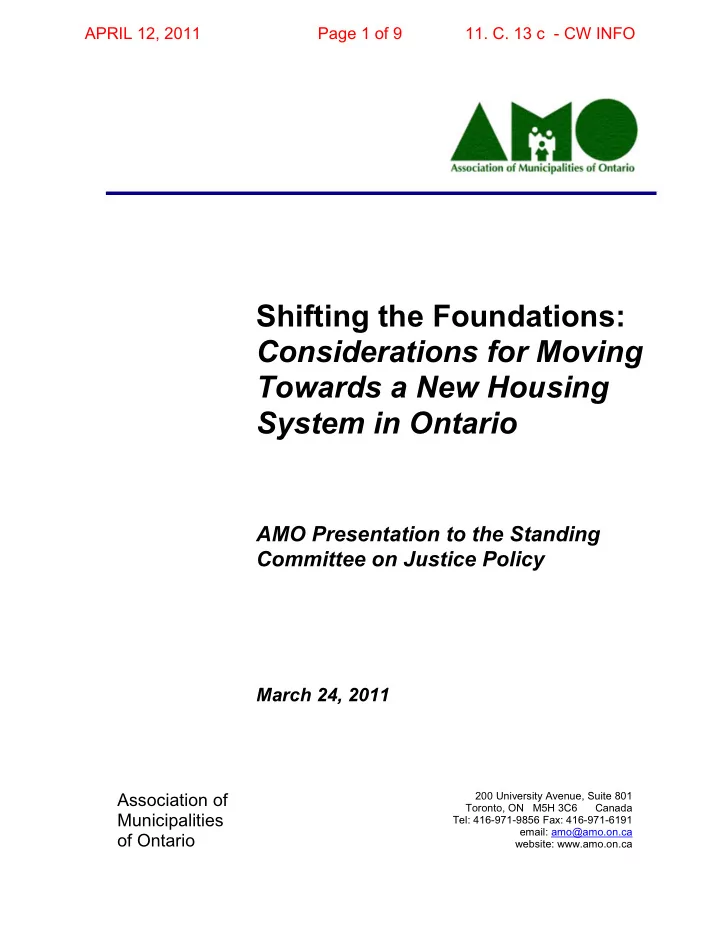
Shifting the Foundations: Considerations for Moving Towards a New - PDF document
APRIL 12, 2011 Page 1 of 9 11. C. 13 c - CW INFO Shifting the Foundations: Considerations for Moving Towards a New Housing System in Ontario AMO Presentation to the Standing Committee on Justice Policy March 24, 2011 200 University
APRIL 12, 2011 Page 1 of 9 11. C. 13 c - CW INFO Shifting the Foundations: Considerations for Moving Towards a New Housing System in Ontario AMO Presentation to the Standing Committee on Justice Policy March 24, 2011 200 University Avenue, Suite 801 Association of Toronto, ON M5H 3C6 Canada Municipalities Tel: 416-971-9856 Fax: 416-971-6191 email: amo@amo.on.ca of Ontario website: www.amo.on.ca
APRIL 12, 2011 Page 2 of 9 11. C. 13 c - CW INFO Shifting the Foundations Introduction My name is Peter Hume, I am the President of the Association of Municipalities of Ontario. As you know, AMO represents almost all of Ontario’s 444 municipal governments and I am here today to speak about important considerations that we believe will strengthen Bill 140. You will have heard from municipalities and other staff associations today, and in general we support their recommendations. Bill 140 turns the page on an era of housing and delivery that just did not make sense. This Bill has the potential to deliver on much of what we asked for a decade ago, save and accept for sustainable funding when the funding and delivery of social housing was downloaded to municipalities. For AMO, the commitment achieved through the 2008 Provincial Municipal Fiscal and Service Delivery Review agreement, to upload social assistance was a significant achievement. While social housing costs did not make their way in to the Agreement, a new approach for a delivery system did. This was well received by municipalities as an opportunity to address local issues and needs, and to potentially find efficiencies in administration and delivery. As the new delivery system evolves, we must acknowledge the fact that municipal governments and a planning system alone cannot respond to the profound need for new financial investments in the system. I do not need to tell you about the waiting lists across Ontario. Our submission today focuses on five recommended amendments to Bill 140. I would be remiss, however, if I did not reiterate the fundamental issues that must be addressed to stabilize Ontario’s failing housing system. Or restated, a housing system that delivers some significant benefits to Ontarians but still fails those in need of affordable housing. Page 1
APRIL 12, 2011 Page 3 of 9 11. C. 13 c - CW INFO Shifting the Foundations Flexibility and Responsiveness Moving to a local planning system approach is certainly the right way to go. Rural, urban, northern and southern municipalities, each have unique needs and capacities. The current expectation is that all service managers will be ready to go January 1, 2012. We think the government should consider a phased approach. Some municipalities have the planning capacity that can get underway and meet the Bill’s timeline. Others will need to build or find that capacity, which will take a bit of time. Devolution occurred over a nine month period, so too must this approach be afforded an appropriate time to succeed. Therefore our first recommended revision is that under regulations for section 6, it should be reframed to state that implementation on service planning should occur no later than January 1, 2013. The consolidation of over 25 housing and homelessness programs is the underlying concern with the local planning approach. The government must understand that municipal councils cannot plan or budget in the absence of knowing what envelope they have to spend from these consolidated programs. It is my understanding that the consolidation exercise is partially underway, but certainly far from being completed. However, local planning cannot be substantially completed or maybe even started until the consolidation exercise is complete and municipalities understand what funding will be available. Municipalities want to get this right. We are accountable to our tax payers and the residents of affordable housing in our communities. Appropriate time is needed to transition to this new way of doing business. If we were to stop and ask ourselves where we want to be in 10 years on the housing file, the proposed way forward makes sense. Articulating a service delivery and planning approach that embraces local flexibility and local responsiveness, also makes sense. Page 2
APRIL 12, 2011 Page 4 of 9 11. C. 13 c - CW INFO Shifting the Foundations But here is the potential bump in the road. What is not easy to analyze or predict right now is the very real potential for an even greater future financial burden on and risk to municipalities. We know that consolidating programs seems to make sense, but we also know that it could mean destabilizing a very important safety net for vulnerable Ontarians. For example, by capping emergency hostel funding, or by reducing currently available funding in the system, the system inherently becomes destabilized. We understand that policy change of this magnitude will require a period of time to find balance, a balance which requires the ongoing financial support and commitment of the provincial and federal governments. Without this, the risk to property taxation and municipal budgets becomes greater. Better Coordination One of the provincial interests stated in Bill 140 under section 4, and a shared interest of municipalities is better coordination. This is our second recommended amendment. To achieve this will require a significant commitment by the provincial government. Inter-ministerial program coordination and consolidation should be mandated within the Bill and/or regulations. Further, the government must mandate the participation of the Local Health Integration Networks and other relevant ministries in the local planning process. In the absence of all key government players at the table, both provincially and in the local planning process, it will be difficult to get to this new system. It is also important that the province works with the federal government to streamline the Affordable Housing Program and the Housing Partnership Initiative to support local delivery. We acknowledge these decisions are out of the province’s direct responsibility and we support the Minister’s ongoing advocacy. Page 3
APRIL 12, 2011 Page 5 of 9 11. C. 13 c - CW INFO Shifting the Foundations Sustaining Ontario’s Housing System Municipalities have demonstrated that they can achieve a great deal at the local level when they have the authority and the tools. However, Ontario’s housing system requires both federal and provincial investments. Local planning alone will not resolve the significant housing issues facing municipalities. Let us compare municipal expenditure growth in the area of housing between Ontario and the rest of Canada from 2000 to 2008 (2008 being the last available year for data). Over this five year period, constant dollar spending per capita for housing in Ontario rose from $98 to $126, compared to just $22 to $41 in the rest of Canada. Why? Because social housing is a mandated municipal responsibility in Ontario, but not in the rest of Canada. This area of expenditure will continue to grow as stock ages and need increases. It means the property tax base will continue to have growing exposure. Municipalities in Ontario have continued to be the heavy lifters in housing. But, there are some very critical systemic, sustainability issues on the horizon that will contribute further to this burden. Issues that are not captured in the Bill 140 but will undermine the entire housing system and leave municipalities and tenants exposed and at risk. � Declining Federal Funding The decline of the federal transfer of $524 million annually has begun and will move to zero over the next two decades. This means municipalities will begin to see significant reductions in these subsidies. It is unclear how municipalities are expected to make up for this loss in funding, which for many municipalities is in the tens of millions of dollars. In addition, a number of other federal agreements are set to expire with no guarantee to be renewed. This means that some existing projects will no longer be viable and municipalities will still be required to maintain affordable housing units. It is not clear what the province’s plan is to address this immanent problem. Page 4
Recommend
More recommend
Explore More Topics
Stay informed with curated content and fresh updates.











